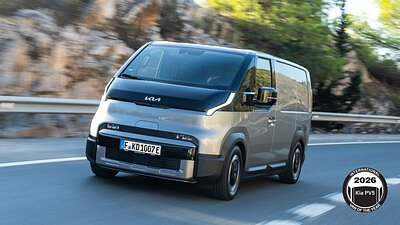
Kia's Electric Van Disrupts Commercial Vehicle Market, Wins Coveted IVOTY Award
Kia’s all-electric PV5 has been named International Van of the Year, marking a significant win for the Korean automaker and signaling a shift towards sustainable commercial transportation. The van boasts innovative features and competitive pricing.
Kia's Electric Van Disrupts Commercial Vehicle Market, Wins Coveted IVOTY Award
LYON, FRANCE – November 19, 2025 – Kia has secured a landmark victory in the commercial vehicle sector, with its all-electric PV5 van named the 2026 International Van of the Year (IVOTY). The announcement, made today at the SOLUTRANS trade show in Lyon, France, represents a first for Kia and for any Korean manufacturer in the prestigious competition. This win not only validates Kia's ambitious entry into the electric commercial vehicle market but also underscores the growing global acceptance of sustainable transportation solutions.
A New Benchmark in Electric Commercial Vehicles
The IVOTY award, judged by a panel of 26 leading commercial vehicle journalists from across the globe, recognized the PV5’s innovation, efficiency, and overall capability. The unanimous decision highlights a significant shift in the light commercial vehicle (LCV) sector, with the PV5 setting a new standard for electric vans. According to the jury, the van impressed with its versatile design, competitive range, and its potential to redefine productivity for businesses. “The PV5 isn’t just an electric van; it's a holistic solution designed with the needs of modern businesses in mind,” noted one jury member. The PV5’s modular platform, combined with its advanced connectivity features, allows for a wide range of customizations, catering to diverse business needs, from delivery services to mobile workshops.
Kia's Bold Strategy and the Rise of PBV
Kia’s victory with the PV5 is more than just an award; it's a testament to the automaker’s strategic shift towards becoming a leading provider of sustainable mobility solutions. The PV5 is the debut model in Kia’s “Platform Beyond Vehicle” (PBV) program, a long-term initiative aimed at developing dedicated electric LCVs. This program signals a departure from simply electrifying existing models and embraces a “clean sheet” design approach, allowing Kia to optimize the vehicle for electric operation from the ground up. “We recognized a growing demand for purpose-built electric vans,” explained a company spokesperson. “The PBV program allows us to meet those needs with vehicles that are specifically designed for commercial applications.” The van’s development prioritizes features such as fleet management integration, over-the-air software updates, and Vehicle-to-Load (V2L) capability, which allows the vehicle to function as a mobile power source.
Competitive Landscape and Market Positioning
The electric van market is becoming increasingly crowded, with established players like Ford, Mercedes-Benz, and Renault vying for market share. New entrants like Rivian are also challenging the status quo. The Kia PV5 differentiates itself through its competitive pricing, versatile platform, and focus on customization. The van offers a range of battery options, including a long-range version that boasts over 250 miles of range on a single charge. This positions the PV5 favorably against rivals like the Ford E-Transit and Mercedes-Benz eSprinter. Kia’s commitment to offering a wide range of body styles, including cargo, passenger, and chassis cab configurations, further enhances its appeal to businesses with diverse needs. A key advantage for Kia is also its integrated fleet management solution in partnership with Geotab, offering a single point of access for vehicle data and insights. “The PV5 is not just about offering an electric van; it’s about providing a comprehensive solution that helps businesses optimize their operations and reduce their environmental impact,” commented an industry analyst.
A Korean First and Global Implications
The IVOTY win represents a landmark achievement for the Korean automotive industry, demonstrating its growing capabilities in the electric vehicle space. Historically dominated by European and Japanese automakers, the LCV sector is witnessing a shift in power. Kia's success with the PV5 signals that Korean manufacturers are capable of competing with the best in the world. This win is expected to pave the way for increased investment in electric vehicle technology in Korea and to encourage other Korean automakers to pursue similar strategies. The PV5’s global launch is planned for late 2025, with initial focus on key markets in Europe and North America. Kia anticipates strong demand for the van, particularly from businesses seeking to reduce their carbon footprint and improve their operational efficiency. The van is also expected to contribute to the growth of the electric vehicle charging infrastructure in these regions. The innovative modular design and the focus on sustainability are resonating with businesses looking for more than just a mode of transport – they’re seeking a partner in building a more sustainable future.
